How to Restore Testosterone in Low T Men
Testosterone Facts
What is Testosterone?
Testosterone is the hormone produced in the testicles that programs a male human embryo cell to develop into a man and then to maintain a healthy male metabolism and physique; it is made in the testicles due to the influence of a brain hormone called LH.
What is a low T level?
Testosterone levels peak during puberty and young manhood at about 1000-1200 ng/dl. From that point on, men experience a slow decline in levels to about 100-200 on average in men who reach their 80s or 90s. If we go by the standard lab ranges, on blood tests a total testosterone less than 250 on 2 separate morning blood tests would be considered low. If we look at free testosterone, a level less than 45 would be considered low. I prefer to use free testosterone when treating patients since measuring total testosterone alone can be very misleading as free testosterone levels are influenced by a protein called SHBG. If SHBG is high, free T is low and vice versa, regardless of total T. Free T is what matters for physical effects in the body.
What if my levels are in the lower end of the range but not low enough to be diagnosed with low testosterone?
In this case, we rely on clinical judgement and individualize treatment to the patient and also evaluate root causes of the lower testosterone. We may decide to still treat with testosterone based on the mans clinical situation or we may use other methods to boost T levels.
Examples of testosterone boosters:
- Clomiphene,
- Enclomiphene,
- HCG
- Anastrozole
- Thyroid Hormone
- Kisspeptin
- Lifestyle factors
- Diet and Exercise,
- Weight Loss,
- Stress reduction
Why do Testosterone levels decline?
Many factors are at play here, some well understood and others less so. First, there is a slow decline in the number and activity of the testicular cells that make testosterone, the Leydig Cells. Without them, testosterone doesn't get made.
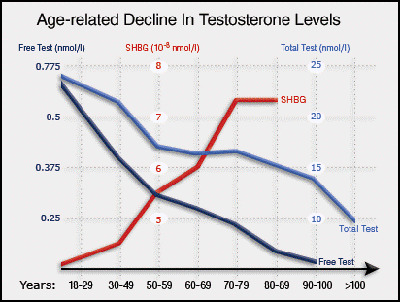
Causes of Low Testosterone
- Ageing
- Testicular Damage from injury or infection
- Poor Nutrition
- Environmental Toxins (Glyphosate, BPA, BPS, etc.)
- Medications
- Plastics
- Pesticides
- Chemicals and Preservatives in Food
- Heavy Metals
- Heat
- Radiation Exposure
- Anabolic Steroid use
- Pituitary Gland Damage causing low LH
What Causes Low LH?
There are several causes of low LH:
- Pituitary Gland Damage
- High Estradiol levels
- High stress/cortisol levels
- High prolactin levels
The pituitary gland in the brain makes LH,which tells the testicles to make testosterone. If there is damage to the pituitary gland, it may make less of a testicular-stimulating hormone called LH. There are many causes for this including stress, pituitary adenomas, sarcoidosis, iron-overload, heavy metal damage to the pituitary, autoimmune disease of the pituitary or hypothalamus, or excess estrogen exposure. If a man with low T has low LH, I will often see benefit from clomiphene or HCG in raising his testosterone.
What are the symptoms of Low Testosterone?
- Fatigue
- Low Libido
- Depression
- Low Drive and Motivation
- Irritability
- Belly Fat increasing
- Muscle Loss
- Erectile Dysfunction (ED)
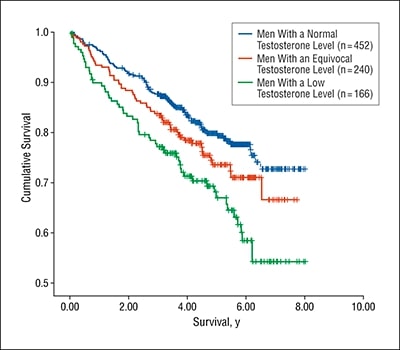
What are the health consequences of Low Testosterone (Low T)?
Diseases associated with or caused by low Testosterone (Low T):
- Erectile Dysfunction
- Hypertension
- Obesity
- Cardiovascular Disease
- Diabetes
- Osteoporosis
- Frailty/Fractures/Falls
- Dementia
- Sleep Apnea
- Anxiety
- Depression
Low-T is associated with low libido and erectile dysfunction. But did you know that fatigue, increased belly fat, falling asleep after eating, sleep apnea, poor mental performance (confusion, indecision, poor memory), loss of muscle mass, bone weakness (osteoporosis), high blood sugar, obesity, diabetes, and an increased rate of prostate cancer and heart disease are also associated with Low-T. Yes, these last two are associated with men who have low testosterone, not high. Low T is associated with a higher overall mortality rate in men.
How can Low-T be treated?
What to expect at your first office visit with Dr. Kaye:
- A thorough and detailed intake questionnaire is filled out by the patient and reviewed by Dr. Kaye in advance of your appointment along with any labs and testing you may already have had done
- At your 90-minute initial appointment, your medical history is reviewed and Dr. Kaye does a physical examination and checks your vital signs and may also check artery health using our Sphygmocore scanner
- Your body composition is checked with our InBody 570 scanner to determine your fat and lean body mass.
- Kaye discusses your diet and lifestyle with you and may suggest ways to improve your health and diet and can recommend high-quality supplements
- You can enroll in our weight loss program and discuss diet in detail with our nutritionist
- Lab testing is ordered
- Prescriptions are ordered as appropriate
- Procedures such as hormone pellets, P-Shot, ED Shockwave, BPH Wave can be scheduled
- A detailed plan of action is produced and given to you
- A follow-up appointment is scheduled to review labs
- After the testosterone treatment program is started, routine follow-up visits and lab review can be done in person or by telemedicine, at 4-6 month intervals depending on your treatment program (pellets, injections, or creams or other medications)
- No monthly fees!
- We only charge for visits and procedures
- Your testosterone is shipped to you by the pharmacy
- Nutritional supplements shipped to you
- You feel great!
The most important thing a doctor should do if we suspect low testosterone is try and figure out why the patient has low T-not just prescribe testosterone.
Diet and lifestyle factors must be optimized. A clean, hopefully organic, paleolithic diet is a must. Without good nutrition, the body can't function properly-and that includes making testosterone. Cut out the junk food.
Lower stress levels; stress reduces LH and thus testosterone. Learn to relax, meditate, play sports, exercise, get enough sleep, have more sex, and perhaps change your job-whatever it takes to lower that chronic stress level. If you feel more libido on vacation than in your day to day life, then this may be your problem.
Remove toxic chemicals from the body. Pesticides and other chemicals can lower testosterone. We can check for heavy metal toxicity and eliminate them if present.
Is there excess inflammation in the body? We work to get it under control.
Is testosterone being converted to estradiol? Estradiol shuts down testosterone production, so we regulate its production to low levels using anastrozole, zinc, chrysin, weight loss to reduce body fat.
We check what level of LH is being produced. LH controls testosterone production and is made in the brain. When LH is high and T is low, we say the problem is in the testicles. If LH is low and testosterone is low, then the problem may actually be in the brain, since the pituitary is not making LH to stimulate the testicles. In that case, I might use Clomid, HCG, aromatase inhibitors.
Testosterone Replacement Treatment Methods
Let's say a man needs actual testosterone. What is the best way to replace it? There are several options:
Testosterone Pellet Therapy
Pellets are the best way to replace testosterone (in men or women). The levels in the blood reach a high level, around 1000-1200 and can be adjusted easily up or down by adjusting the number of pellets inserted. They are inserted on the hip or flank (love handle) area in a minor office procedure which is painless and takes 10 minutes, and last about 4 months. The cost is very reasonable.
Men on pellets feel greatly improved libido, erectile function, energy, mental focus, better performance in the gym, fat loss, and overall vigor. The testosterone and estradiol levels are easy to monitor by simple blood testing.
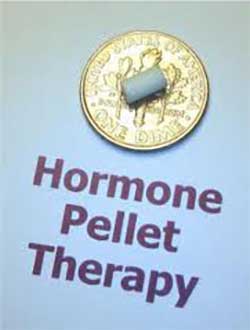
Hormone Gels or Creams
I prefer to have testosterone gels or creams compounded by a specialty pharmacy as I can adjust the strength of the cream and are usually cheaper than brand name products at about $50/month.
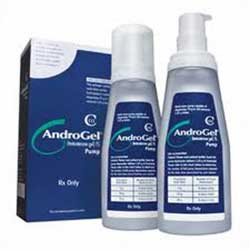
Men who have tried gels and pellets, usually prefer the pellets. The downside to creams and gels is that the gel can spread all over your home and workplace so any women in your life will be exposed and show higher than normal testosterone levels. For this reason, men with daughters or wives often prefer pellets or injections. It has to be applied to hairless skin, so this can be a problem for hairy men. Travel is convenient and application is painless.
WARNING: Testosterone applied to the skin will turn into DHT, the hormone that makes your prostate enlarge and the hair on your head fall out! For this reason, I encourage either pellets or injections as a first approach. If a man wants to use a skin cream or gel, we MUST monitor levels of DHT and keep them in the low normal range with medication to prevent these serious adverse effects.
Testosterone Injections
Testosterone injections are a tried and true method that achieves satisfactory blood levels without contaminating others and injected testosterone tends not to convert as much to the DHT hormone.
The blood levels are reasonably steady as with pellets, but do oscillate up and down with each injection.
We will prescribe testosterone injections in natural oils such as MCT Oil and can combine the testosterone with anastrozole to keep estradiol levels in the normal range. The commercial products may cause allergic reactions in some men as they are mixed with plant oils such as cottonseed oil, soybean oil, etc.
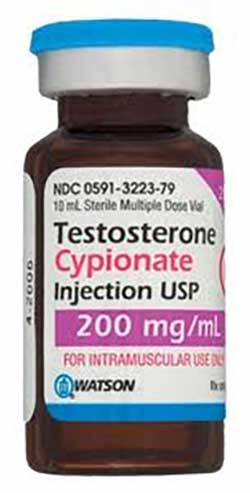
Travel can be an issue with injections; testosterone bottles may be forgotten and left at home. Gels and pellets are easier to travel with.
Athletes often prefer injections as they have no "down time" as with pellets. Estradiol levels, hematocrit, PSA, and DHT MUST be monitored and controlled carefully with injection therapy.
Testosterone Patch
I don't recommend the testosterone patch since it is large and sticks so tightly to the skin that removing it causes a skin burn.
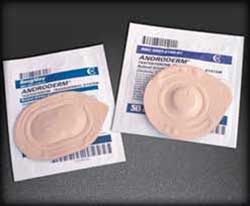
Kisspeptin-10
Kisspeptin-10 is a peptide that triggers the production of LH and FSH when injected. It is normally found in high levels in teenagers and is the trigger to start puberty. It can be used to boost natural testosterone production in older men and to reverse testicular atrophy caused by testosterone use.
HCG and Clomid
These are drugs that either mimic LH (HCG) or cause the pituitary to secrete more LH (Clomid). LH causes the testicle to make more testosterone if the testicle is healthy. They can be useful to preserve fertility or testicular size in men on TRT. Some younger men can use these instead of testosterone and make enough testosterone with these drugs alone. Some men combine HCG with testosterone pellets or injections as they feel it "smoothes out" the testosterone effect and maintains testicular size and fertility.
Rescue of testosterone production after anabolic steroid abuse
Anabolic steroid use can shut off testosterone production. However, if one is treated with HCG, HMG, anastrozole, and kisspeptin, it is possible to restore normal testicular function and testosterone production. I have had success in treating such a client who wished to conceive a child with his new wife after decades of testosterone use.
Other Options
Supplements advertised on TV and online may slightly improve libido and perhaps slightly increase free testosterone levels but not to the levels needed by men who are truly hormonally deficient. And they do nothing about fixing the root causes or treating excess estradiol. I don't recommend them. Many of my patients have tried these products without any real benefit.
What can you expect from your treatment program?
At Optimal Wellness MD, we take a comprehensive approach to your health. We gather data from your history, examination, labs and other testing. We will then look at all the data, combined with your physical exam findings and discuss healthy diet and lifestyle and options for treatment. Many of our patients have co-existing health issues and we put all the pieces together and come up with a plan of treatment. We want to prioritize what YOU feel is most important. For some men it may be an improved sense of energy and motivation, a better libido, better erections. Others may be more focused on weight loss and prevention of heart disease or diabetes. Be assured, we will address all your concerns relating to hormones and even address your non-hormonal issues such as IBS, food and environmental allergies, thyroid and adrenal disorders, chronic fatigue/fibromyalgia, autoimmune diseases, cholesterol and heart-disease prevention, nutritional deficiencies and supplements, and mood disorders.
All BHRT prescriptions are individualized for each patient and we monitor your symptoms and blood testing carefully to make sure you are taking exactly the right dose for you--this is not a one size fits all approach.
For men with Erectile Dysfunction who do not get full improvement after diet and hormones are optimal, we offer several effective therapies: ED Shockwave, the P-Shot and Botox injections or "Bocox". We can customize medications for ED to get results much superior to those available through your local pharmacy.
These treatments have up to 90% rate of significantly improving erection hardness, duration, and sensitivity.
Frequently Asked Questions about Testosterone Treatment
- Will using testosterone reduce my fertility? If you take an excess amount of testosterone, the body responds by reducing testicular function. If the testosterone treatment is correctly dosed and is combined with clomid or HCG or kisspeptin, this does not happen and fertility should remain the same. It is important to dose testosterone properly, so levels remain in the top third of the normal range and not above that to avoid testicular atrophy.
- Will my balls shrink? As above, if testosterone is used alone and dosed too high, there will be some shrinkage. If testosterone is combined with HCG or clomid or kisspeptin, testicular size is preserved.
- Will I have to stay on Testosterone for the rest of my life? No, as with any hormone treatment, you can stop it and your body will return to the state it was originally in, but you will lose the benefits from the testosterone as well. Very few men decide to stop their treatment once they start as they like how they feel and look on testosterone.
- Can I stop taking testosterone? Of course you can stop it at any time, but you will lose the benefits as it wears off.
- If I stop taking testosterone, what will happen? Your body returns to its pre-testosterone hormone levels and the benefits from the testosterone disappear unless the root causes of the low T are corrected.
- Is testosterone expensive? No, depending on what form of treatment you choose, at Optimal Wellness MD it can cost as little as $100/month for injections including doctor visits, up to $300/month for pellets including doctor visits, depending on the dose. Online companies charge membership fees of $100-$300/month billed annually and then charge upwards of $300/month for just the testosterone injections and you don't see a doctor! Not only do you receive superior medical care at Optimal Wellness MD, but we are also less expensive!
- Is taking testosterone dangerous? If prescribed correctly and if your blood tests and physical condition are monitored by a doctor, testosterone treatment is safe and effective. Testosterone dosing must be adjusted based on physical symptoms and blood tests, so it is very important to work with a doctor who sees you in person in the office. Online services are not a good substitute and are dangerous. If you are not seeing a doctor and you develop problems such as prostate issues (BPH, Prostatitis, Prostate Cancer), problems with urination, high blood hematocrit, high estrogen, hair loss or acne, breast growth, high PSA levels, you need to be working with a doctor who knows how to manage your condition. If you are buying testosterone online, you won’t get that kind of care, and likely spend more too.
- What results can I expect from Testosterone treatments? If you are treated with a correct dose of testosterone, men report increased energy, improved mood and drive, higher libido, harder erections, increased muscle gains at the gym even if older, loss of unwanted body fat, less joint soreness and stiffness, better sleep, sharper mind. These results occur over weeks to months as your body adjusts to the testosterone.
Testimonials
Request Your Testosterone Replacement Consultation in Lynnfield Today!
If you have questions or think you may be a candidate for one of these treatment modalities or your current physician doesn't seem quite "up to date" on these issues, feel free to call my office and I'll try to assist you. To make an appointment, please call 781-933-4200 or fill out our online contact form below. We offer testosterone services in Lynnfield, Boston, Cambridge, and the surrounding areas.
